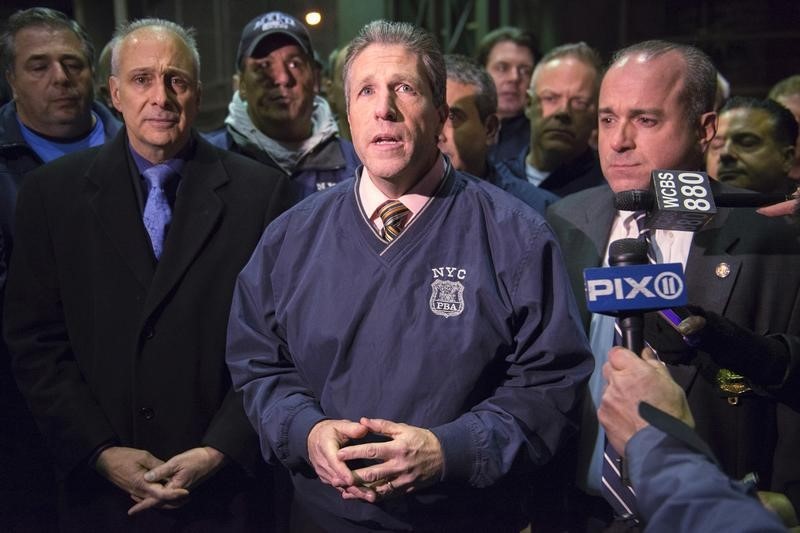By Laila Kearney
NEW YORK (Reuters) - Patrick Lynch, the combative head of New York's largest police union, won a new term at the helm of the Patrolmen's Benevolent Association after fending off his first election challenge in more than a decade, the union said on Friday.
Rank-and-file police officers in the largest U.S. city handed Lynch a fifth four-year term as PBA president, despite criticism by two rivals who said his confrontational style was out of step with New York's current political climate.
Lynch, the longest-serving PBA president in modern times, won the election by a landslide in "an incredible show of union solidarity," the PBA said in a statement.
"A single tenet has and will continue to guide us as we look to the future: do what's in the best interest our members," Lynch said. "These results give our team a mandate to continue that work."
A PBA spokesman could not be reached immediately for further comment.
Lynch was first elected in 1999 and built a reputation as a fierce advocate for his membership, challenging New York mayors over issues such as police benefits and safety.
In their campaigns, the challengers, veteran officers Brian Fusco and Ronald Wilson, said Lynch's trademark combativeness has begun to work against the interests of the police force, an assessment that failed to sway the rank and file. Neither Fusco nor Wilson could immediately be reached after the result was announced.
One of the most pressing issues facing Lynch in his new term is sealing a new labor deal for officers to replace the one that expired in 2010. Talks with the city are due to go into binding arbitration. The PBA is the last of the five NYPD unions to come to terms with the city.
Lynch attracted attention last year for engaging in a months-long public battle with Mayor Bill de Blasio as tensions rose between the NYPD and the public. Civil rights activists in New York City and elsewhere in the United States have decried how police treat African-Americans and other minority groups.
Lynch accused de Blasio of being too sympathetic toward demonstrators who took to the streets after a number of high- profile incidents involving police and black men.
At the same time, he said the mayor was overly critical of police officers charged with enforcing the law.
Tensions came to a head in December after two uniformed New York police officers were shot dead by a man who said on social media that he wanted to avenge the deaths of men killed in confrontations with police.
Lynch denounced de Blasio, saying he had "blood on the hands" and blaming him for anti-police sentiment in the city. Police turned their backs on the mayor at the officers' funerals.
Lynch and de Blasio appear to have settled their differences, shaking hands at a funeral last month for an officer who was shot and killed while on patrol.
However, a new point of contention seems to be emerging between them. In his preliminary budget proposal, de Blasio excluded funds for hiring hundreds of officers, bucking the wishes of his own police commissioner, William Bratton, and police unions.

Lynch said on the PBA website that a shortage of patrol officers has led to an increase in murders and shootings in the city this year.